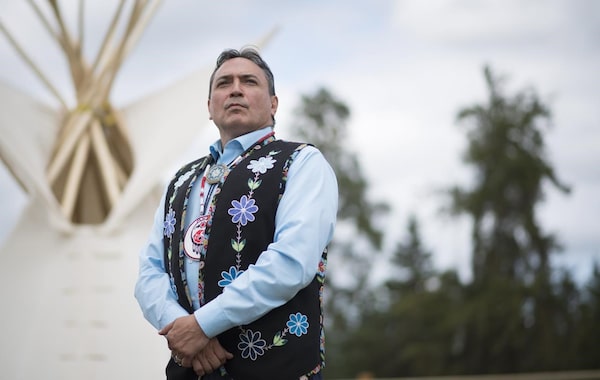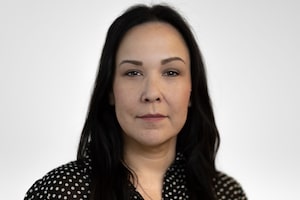
Assembly of First Nations National Chief Perry Bellegarde assumed the role in late 2014 and was re-elected in 2018.The Canadian Press
First Nations leaders are expected to hold an election for a new national chief of the Assembly of First Nations this week, at a time when discoveries of unmarked burial sites near former residential schools have made the role especially critical.
The election is set to be held virtually on Wednesday, during the AFN annual general assembly. In May, some Indigenous leaders, citing concerns that many voters don’t have reliable internet access, called for the vote to be postponed until pandemic restrictions are lifted and candidates can once again travel to communities.
First Nations leaders are expected to vote, on Tuesday, on a draft resolution to delay the election. The resolution states that legitimate concerns have been expressed by chiefs and leaders about the fairness of proceeding with an internet-based vote. It also notes that the AFN charter does not provide for online elections.
If the election proceeds as planned, it will take place against a complex political backdrop. Governments across Canada are facing pressure to take more action to advance reconciliation in Canada, particularly as the effects of residential schools come into sharper focus for Canadians. First Nations groups have announced preliminary discoveries of unmarked gravesites near three different former residential schools in recent weeks.
The current national chief, Perry Bellegarde, assumed the role in late 2014 and was re-elected in 2018. He announced in December he would not run again. He told The Globe and Mail recently in an exit interview that it is a human-rights violation of the highest degree that children who attended residential schools were buried and forgotten.
The recent discoveries, he said, are “a validation of what survivors of residential schools have been saying. It has woken up the country – it has woken up the world to that genocide. And Canadians are demanding justice and reconciliation.”
Mr. Bellegarde said the next step will be to ensure proper research and investigation into those schools can be done in a respectful way. He added that those investigations should be led by First Nations leaders, elders and community members.
The AFN is an advocacy organization representing more than 900,000 First Nations people in 634 communities across the country. The assembly’s national chief plays a key role in trying to influence federal government policy.
The organization holds an election for the position every three years. Mr. Bellegarde’s successor will have to navigate critical working relationships with the Prime Minister, the federal cabinet and premiers across the country.
Candidates for the role of national chief include RoseAnne Archibald, who announced in May that she wouldn’t be seeking re-election as the Ontario regional chief of the AFN; Muskowekwan First Nation Chief Reginald Bellerose, from Saskatchewan; Nishnawbe Aski Nation Grand Chief Alvin Fiddler, who represents 49 Northern Ontario communities; Jodi Calahoo-Stonehouse of Michel First Nation in Alberta; Kevin Hart, who has served as Manitoba regional chief; Lee Crowchild of Tsuut’ina First Nation in Alberta and Cathy Martin of the Listuguj First Nation in Quebec.
According to the AFN Charter, candidates for national chief have to be 18 years of age or older, of First Nations ancestry and members of First Nations communities in good standing with the AFN. The national chief must be elected with a 60-per-cent majority of the votes. If no candidate reaches that threshold, there are additional rounds of voting.
Some of the key issues being discussed during the race include treaty rights, self-government and supports for survivors of intergenerational trauma, including former residential school students. Candidates have also taken positions on the United Nations Declaration on the Rights of Indigenous Peoples. (Last month, the Senate passed a piece of legislation that mandates that the federal government ensure that Canadian laws are consistent with the declaration.)
In the run-up to the election, there have been calls for voters to elect a woman national chief – something that has never happened in the AFN’s history. A woman’s name didn’t so much as appear on the ballot until 1994.
Sheila North, who is currently running for grand chief of the Assembly of Manitoba Chiefs, ran for national chief in the 2018 election, but lost to Mr. Bellegarde. She said in an interview that colonization has affected the way Indigenous people and communities govern and lead.
“It’s given the message that women can’t lead and women shouldn’t lead” she said. “Unfortunately Canada, and even us as Indigenous people, sometimes believe that.”
Yukon Regional Chief Kluane Adamek, one of four female regional chiefs within the AFN, said the assembly needs to create space to elect women and also to support them.
Tania Cameron, who is a former NDP candidate serving as Ms. Archibald’s campaign manager, said she sees many men as chiefs both regionally and locally. Although she said many are “strong feminists,” she wonders why a woman hasn’t been able to break the AFN’s glass ceiling.
Ms. Cameron also said she was disappointed in the 2012 AFN election, in which four women ran for national chief. In that election, Pam Palmater finished second, behind Shawn Atleo.
“There’s this old boys network that comes into play,” Ms. Cameron said.
Know what is happening in the halls of power with the day’s top political headlines and commentary as selected by Globe editors (subscribers only). Sign up today.
 Kristy Kirkup
Kristy Kirkup Willow Fiddler
Willow Fiddler